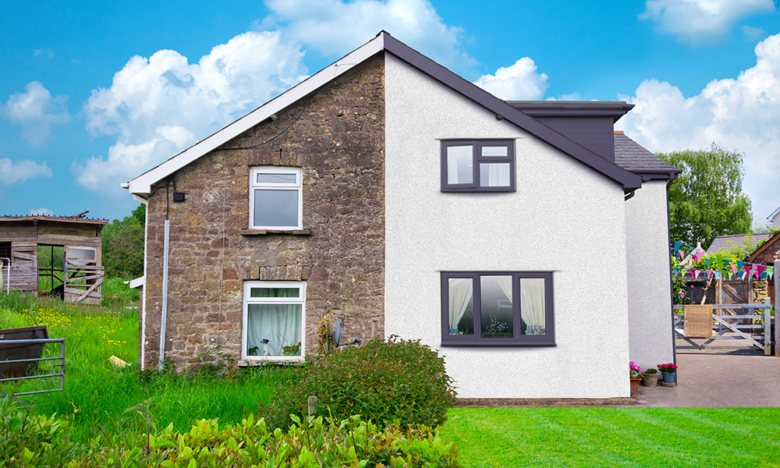
What Brings Down a Property’s Value?
As a homeowner, it’s important to be aware of possible ways to add value to a house and know what can bring down a property’s value. Some of these, such as supply and demand or the broader economic situation, will be beyond your control, but many of them will offer an opportunity for you to boost the value of your home.
Rundown Exterior
We all know the importance of kerb appeal – how attractive your house looks from the street – and an untidy, unkept and unwelcoming approach to the house is an undoubted turn-off for buyers and will impact your property’s value. This could be an easy fix, with a fresh coat of paint for the woodwork, new fences and gates and some weeding. But, if your property is less appealing architecturally, cladding or rendering could give it a whole new look and add value.
Dated décor
Once inside, many factors can help to reduce a property’s value. One of the most obvious will be dated or poor quality décor. While you may be a fan of bold colours and retro fittings, or you haven’t got around to replacing old carpets and wallpaper, potential buyers will immediately be adding up how much they’d need to spend to bring the space in line with how they live. That figure will be reflected in any offer they make. Easy fixes could include:
- Painting rooms with more neutral colours.
- Updating small features such as light fittings and door handles.
- Fixing any obvious defects such as cracks in walls or chipped paint.
If budgets allow, kitchens and bathrooms are always suitable spaces to spend money on when looking to modernise a home.
Too much clutter
While considering your décor, also consider whether your home has too much in it and whether spaces are clearly defined. If your home is cluttered, it will feel smaller than it is, and if spaces aren’t clearly defined, prospective buyers will struggle to visualise how they would use a space.
Property damage
It may also be that over time, you notice issues with your property, such as a missing roof tile, cracks in the external walls or damage to guttering. As you see these evolve over time, it can be easy to discount them as minor issues, but they should always be dealt with as soon as possible to avoid worse problems down the line. Particularly, look for any signs of structural damage, such as cracks in walls and ceilings, uneven floors or ill-fitting doors and windows. These could have a major impact on property value and will be picked up by a potential buyer’s building survey, so rectifying them in advance can avoid protracted negotiations and delays when selling.
Property size
The size of your property will also impact its value, and while extensions, loft conversions and garden offices can all help add square footage, they won’t come cheap. One option is to look at improving your current layout. This could include knocking down walls to create an open plan layout and improve the flow between spaces, or if bathroom space is tight, consider removing the bath to free up space for a modern, walk-in shower. If the master bedroom is spacious enough, adding an en suite may also be an option, a must for many buyers. You’ll need a party wall specialist if you are considering bigger projects, such as a loft conversion. It’s also worth checking house prices in the area for properties that have done similar work so you know how much you can spend and still benefit from the added value.
Potential for improvement
If you prefer not to undertake major work, don’t worry, though. Some buyers prefer a property with potential so they can design a home that works for their exact needs. The price they’re willing to pay will reflect the work they want to do, but it does mean you won’t have to manage any major projects.
Bad neighbours
Unfortunately, not everything that brings down a property’s value can be easily improved, and no matter how pristine your home is, if your neighbours don’t take the same care with theirs, it will affect your home’s value. While there may not be much you can do to encourage them to improve their home, simple things such as offering to mow their lawn or cut back their hedges when you do yours could be an option.
Local area
Issues in the wider local area will also negatively impact a property’s value. So if, for example, the crime rate is higher than average in your local area or you’re situated in a noisy spot, such as by a train station or on a main road, this will be reflected in the property’s value. Areas of higher environmental pollution will also be similarly impacted.
Flooding
In terms of environmental issues, being in a home that has previously flooded or is in an area prone to flooding could substantially affect value. If this is the case, there are things you can do to mitigate the impact, such as installing new drainage systems and fitting non-return valves in drains; opting for wooden floors over the carpet to make clean up easier; and making sure electricity mains and power points are not at floor level so any water will do less damage.
School ratings
Buyers will undoubtedly pay more for houses in the catchment areas of good schools, so if the primary or secondary schools near you aren’t as highly rated, they won’t be valued as highly.
Local infrastructure
In addition to schools, the amenities in the wider local area will also have an impact. Buyers often want easily accessible amenities, such as shops, restaurants, green spaces and gyms, that they can use. If your local shopping area is run down, stores are closing or public spaces aren’t well looked after, buyers may view the area negatively and value your property less.
Economic factors
Finally, a whole host of wider economic factors could bring down the value of your property, despite your best efforts. For example, if houses aren’t in demand in your area, if interest rates continue to rise and mortgages become harder to secure, or if buyer demographics in your area simply don’t match the house you’re trying to sell, this will all be reflected in its value.
Novello offers timely, accurate and cost-effective surveys and valuations carried out by expert RICS-qualified surveyors. To find out more, contact us or arrange a free quotation now.

